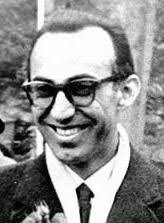Fereydun Adamiyat فریدون آدمیت | |
|---|---|
 | |
| Born | 23 July 1920 |
| Died | 29 March 2008 (aged 87) |
| Resting place | Behesht-e Zahra |
| Nationality | Iranian |
| Alma mater | Dar ul-Funun University of Tehran |
| Occupation(s) | Iranian politician and historian |
| Relatives | Abbas-Gholi Adamiyat (father) |
Fereydun Adamiyat or Fereidoon Adamiyat (23 July 1920[1] in Tehran – 29 March 2008) (Persian: فریدون آدمیت) was a leading social historian of contemporary Iran and particularly the Qajar era. He was the son of Abbasquli Adamiyat, a pioneer of the Iranian Constitutional Revolution. Fereydun Adamiyat received his B.A. from the University of Tehran and his PhD in diplomatic history from the London School of Economics.[2][3] He is known for his original works on various aspects of the social and political history of Persia, most of them dealing with the ideological foundations of the Iranian Constitutional Revolution. Believing firmly in history's "Rational Movement" (Persian: حرکت عقلی, harekat-e ʿaqlī), Adamiyat saw no conflict between normative judgement and claims to objectivity.[4] Although predominantly published in Persian, he is often cited by Western scholars. His most famous book was Amir Kabir and Iran (Persian: Amīr Kabīr va Īrān) (one of several re-publications: Tehran: Kharazmi Publishing, 1975/1354).
Prior to his academic activity, Adamiyat was also a diplomat, serving as Iran's ambassador to the Netherlands and India. He also worked for the United Nations in various capacities.